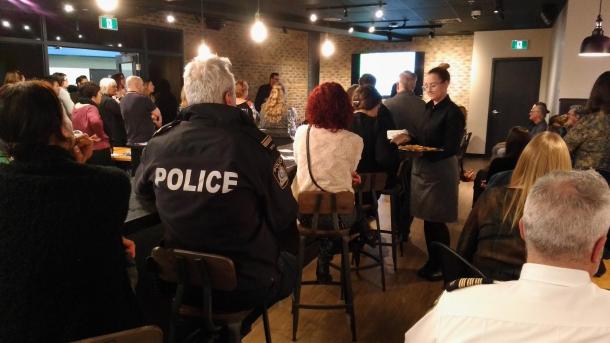The House of Sophia
A shelter for homeless women in St-Jerome

The House of Sophia is a unique community organization. Like many others, it offers a temporary shelter to women in difficult circumstances. Yet, its approach is so original that a university research project was recently conducted about the work of the House of Sophia. On March 27, a symposium was organized in St-Jerome to present the preliminary results of this study. In addition to the research team, eighty guests attended the banquet.
Opened in 2012 with the financial support of MCC Québec, the House of Sophia is located in St-Jerome, at the heart of Québec ‘s Laurentian region. Its mission is to provide personalized support to homeless and at-risk women as they strive for social reintegration and empowerment.
The attendants included partners, past and present beneficiaries, students of the Université du Québec en Outaouais (UQO), two officers from the St-Jerome police and many others connected in some way to the House of Sophia.

The symposium started with testimonies from the House of Sophia’s past residents, who successfully regained their autonomy thanks to founder and director Sylvie Plante’s genuine and compassionate leadership.
Sylvie Plante fondly recalls the first moments when she envisioned the starting idea. As soon as 2007, she was participating in the MCC program Summerbridge with MCC Québec and her project that summer consisted of conceiving what the House of Sophia would become.
But what is the House of Sophia’s original approach and how did it catch the eye of a university research team?
The research
The research’s title is “Participative research on the House of Sophia’s emerging practice and its effect on homeless women or women at risk in the Rivière-du-Nord area.” Starting in the fall of 2017, the research stretched over fifteen months. Very few inquiries have been conducted on this subject in the St-Jerome area. The study reveals that homelessness affects an increasing number of older people, and that homelessness has grown by 25 percent. The purpose of the research was to understand and describe the problem of female homelessness and to offer insights on how to better support women toward residential stability. Testimonies highlighted the House of Sophia’s work in providing a roof with comfort and security to women, as well as a safe place of reflection to figure out the next steps with serenity and hope.
Methodologically, the research first consisted in 50 -hours of active observation. It involved a sustained presence on- site as observations were noted, as well as multiple interviews with professional staff, volunteers, interns and women in treatment. Interviews were also conducted with the House’s director Sylvie Plante and board members.
Many aspects of the work with homeless women were discussed: the trajectory of women in urban and rural settings, women’s perceptions of homelessness, the personal and relational impact of the House of Sophia’s work practices, the question of social reintegration and the identified needs of women. However, the research pointed out that each case was unique and that every woman in difficulty has her own trajectory different from that of other women struggling with homelessness. Also noted was that among the causes of female homelessness there are the interrelated problems of poverty, housing, mental health, bereavement, domestic violence and loneliness.
An invisible problem
Female homelessness stands as a largely unknown phenomenon, which increases the seriousness of the problem. Many women struggle to satisfy their fundamental needs such as finding a home, feeding themselves having basic hygiene habits, and so on.
The singularity of female homelessness is that it is often invisible and, so, very difficult to notice.
The main reason is usually women tend to take better care of their appearance than men. They also tend to keep their situation to themselves because they feel ashamed about it. Unfortunately, the invisibility of female homelessness means it is hard to grasp the gravity of the problem and alleviate it.
Many aspects of the matter are to be considered: safety from violence, access to resources, a healing process, long-term reintegration, addiction recovery, affordable housing, etc. Considering these elements, the House of Sophia strives to respond to the need for safety, emotional stability, resources and support, and the need to retrieve autonomy and self-esteem.
The House’s philosophy of intervention rests on humane practices, and uses holistic, systematic and collaborative measures adapted to the diversity of cases, much like what MCC embodies. Since 2012, MCC Québec has funded this social work. Past and present MCC Québec staff thus rejoice in the blooming of House of Sophia’s outreach, which is now affirmed by academia as relevant and useful work.
When people donate to or volunteer with MCC, they enable the House of Sophia to move ahead in its unique mission to serve homeless women in the much deprived St-Jerome area.

